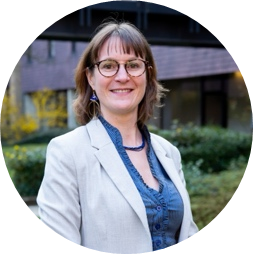Biocultural Rights, Indigenous Peoples, and Local Communities: Protecting Culture and the Environment
Webinar recording
Abstract
This lecture will investigate the role of biocultural community protocols in safeguarding the biocultural rights of Indigenous and local communities. In so doing, the lecture will analyse the nature and role of biocultural community protocols within the context of access to genetic resources and benefit sharing, linking this to the rise of biocultural jurisprudence and the interlinkages between cultural diversity and biological diversity conservation. The lecture will also provide critical insights about biocultural community protocols, raising questions including whether these protocols can be seen as political tools and representational strategies used by Indigenous peoples in their struggle for greater rights to their land, territories and resources, and for more political space.
About the speakers

Christine Frison
FNRS post-doctoral researcher at the Law Faculty of UCLouvain, an associate researcher in the Government & Law research group at the University of Antwerp (Belgium) and an associate fellow at the Centre for International Sustainable Development Law (McGill University, Canada).
Christine Frison holds a Ph.D. jointly conducted at the Center for IT&IP Law (KU Leuven) & Center for Philosophy of Law (UCLouvain), a LL.M (Public International Law, ULB) after carrying out studies in France and the UK. Her area of expertise is international environmental law (IEL) with a focus on agrobiodiversity law/governance. Her latest research dives into digital sequence information on seed varieties, analysing how genetic resources sequencing is governed in international negotiations (Aubry, Frison et al 2021). She taught IEL (ULB, UAntwerp) + occasionally at SciencesPo Paris & other European universities) and has been a consultant for international organisations (e.g. European Commission, Convention on Biological Diversity, United Nation Environment Program, Bioversity International, etc.) & the Belgian Federal Ministry of Environment. She published numerous articles and four books, the last one being “Redesigning the Global Seed Commons: Law and Policy for Agrobiodiversity and Food Security”. She received three awards for her research.
 Fabien Girard
Fabien Girard
Associate Professor (tenured) at the Faculty of Law, Université Grenoble Alpes (UGA) in France
Fabien Girard teaches legal philosophy, agrobiodiversity and the law, and comparative law. He was recently appointed Junior member of the Institut Universitaire de France (as of October 2022). Between 2011 and 2013, he was nominated as a Project Manager to the Haut Conseil des Biotechnologies in Paris (France), where he worked on industrial property, plant biotechnology and farmers’ seed networks. While on secondment at the Maison Française d’Oxford (MFO – Oxford, UK) from 2014 to 2016, he conducted a research program called “Theory of Law and Legal Anthropology”. As part of that responsibility, he organized several conferences and workshops on legal and political philosophy, as well as on the international governance of biodiversity. He has written extensively on the connections between biotechnology, plant innovation and industrial property, as well as on formal and informal seed systems and crop genetic diversity. His last two co-edited books, The Commons, Plant Breeding and Agricultural Research. Challenges for Food Security and Agrobiodiversity (with Christine Frison) and Biocultural Rights, Indigenous Peoples and Local Communities. Protecting Culture and the Environment (with Ingrid Hall and Christine Frison) were published respectively in 2018 and 2022 with Routledge.
About People, Plants and the Law Online Lecture Series
The People, Plants, and the Law lecture series explores the legal and lively entanglements of human and botanical worlds.
Today people engage with and relate to plants in diverse and sometimes divergent ways. Seeds—and the plants that they produce—may be receptacles of memory, sacred forms of sustenance, or sites of resistance in struggles over food sovereignty. Simultaneously, they may be repositories of gene sequences, Indigenous knowledge, bulk commodities, or key components of economic development projects and food security programs.
This lecture series explores the special role of the law in shaping these different engagements, whether in farmers’ fields, scientific laboratories, international markets, or elsewhere.
Note that all dates and times displayed are in Australian Eastern Standard Time (AEST).



